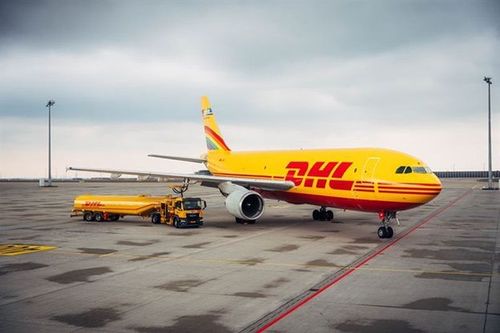Neste and DHL Group to tighten collaboration to reduce logistics emissions

Fueling of a DHL aircraft. / Source: DHL Group
February 10, 2025
BY Neste Corp.
To further strengthen their collaboration on reducing emissions in logistics, DHL Group and Neste have agreed to jointly evaluate how Neste’s renewable solutions such as renewable diesel, also known as “HVO100”, and sustainable aviation fuel can support DHL in its decarbonization targets in air and road transportation.
DHL Group aims to achieve net-zero greenhouse gas emission logistics by 2050. Interim targets by 2030 include electrifying two-thirds of last-mile delivery vehicles and increasing the share of more sustainable fuels across all transportation modes to more than 30%, which includes also the use of sustainable aviation fuel (SAF). Neste, as a leading producer of renewable diesel and sustainable aviation fuel, would support DHL Group in achieving these goals.
To enable DHL Group to achieve its air transportation targets, the parties will develop a commercial model that would gradually lead to the offtake of around 300,000 tons of neat, i.e. unblended SAF per year from Neste by DHL Group by 2030 and enable the sale and purchase of additional volumes of SAF. At the same time, DHL Group and Neste will work together to explore using renewable diesel to support DHL in achieving its decarbonization targets in road transportation.
“The signing of this agreement with Neste is a significant step in our strategy to achieve net-zero emission logistics by 2050. By closely collaborating with a leading producer of renewable fuels, we can further advance on our interim targets. Together with Neste, we will develop innovative solutions that support our own sustainability goals and eventually also those of our customers,” said Yin Zou, EVP Corporate Development DHL Group.
“We are looking forward to further strengthening our existing cooperation with DHL Group through a holistic, joint approach to tackling GHG emissions in transportation. This gives us a chance to support DHL as a frontrunner in its field with our renewable fuels, which provide a solution to reduce GHG emissions on the road as well as in the air,” says Carl Nyberg, Senior Vice President, Commercial, Renewable Products at Neste.
The companies have already been working successfully together for several years, for example in the field of sustainable aviation fuel deliveries. Additionally, Neste and DHL Group supported the International Sustainability & Carbon Certification (ISCC) to pioneer and test the ISCC Credit Transfer System, which enables airlines, logistics providers, and end customers, such as corporations, to credibly report the emission reductions achieved using SAF for reducing their carbon footprint in air travel and freight transport.
Advertisement
Advertisement
Advertisement
Advertisement
Related Stories
Keolis Commuter Services, the Massachusetts Bay Transportation Authority’s operations and maintenance partner for the Commuter Rail, has launched an alternative fuel pilot utilizing renewable diesel for some locomotives.
Virgin Australia and Boeing on May 22 released a report by Pollination on the challenges and opportunities of an International Book and Claim system for sustainable aviation fuel (SAF) accounting.
The U.S. House of Representatives early on May 22 narrowly passed a reconciliation bill that includes provisions updating and extending the 45Z clean fuel production tax credit. The bill, H.R. 1, will now be considered by the U.S. Senate.
Chevron U.S.A. Inc. on May 15 filed a notice with the Iowa Workforce Development announcing plans to layoff 70 employees at its Ames, Iowa, location by June 18. The company’s Chevron REG subsidiary is headquartered in Ames.
Luxury North Dakota FBO, Overland Aviation—together with leading independent fuel supplier, Avfuel Corp.— on May 19 announced it accepted a 8,000-gallon delivery of sustainable aviation fuel (SAF) on May 12.
Upcoming Events










